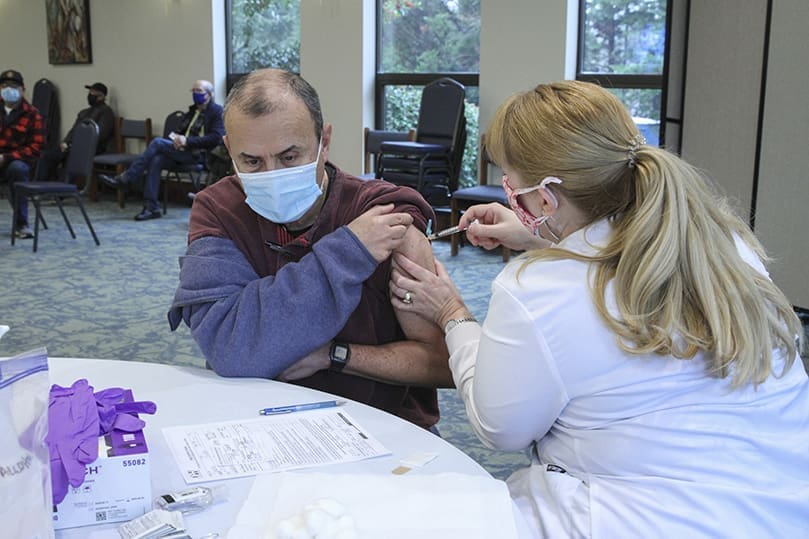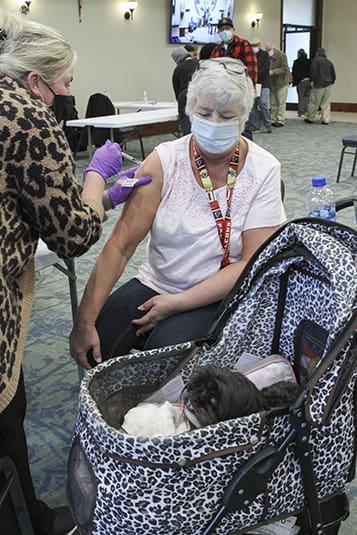 Photo By Michael Alexander
Photo By Michael AlexanderGainesville
Gainesville parish partners with health officials to immunize at-risk members
By ANDREW NELSON, Staff Writer | Published March 15, 2021
GAINESVILLE–For Maria Perez, the day was long-awaited when she would roll up her sleeve and get jabbed in her arm with the coronavirus vaccine.
“Very, very happy because for the first one, I didn’t get any symptoms at all. And I was waiting for this one, like I was waiting for the Lord,” said Perez smiling beneath a black mask decorated with colorful flowers.
A February collaboration between St. Michael Church and the Hall County Department of Public Health converted the roomy parish hall into a vaccination site to help turn the corner on the pandemic. The goal was to vaccinate 100 parish members 65 years and older. Everyone was on their follow-up visit to get their second dose of the vaccine.
Hall County is among the top counties in the state severely impacted by the disease. The virus put more than 2,200 people here in the hospital and killed 392.
Deacon Ken Lampert, the parish business manager, initially feared there would be too few people interested in the public health outreach, but then as interest grew he was concerned about turning away people who were clamoring to get the vaccine. The list of vaccination appointments closed with 120 people. His fears about demand exceeding supply were resolved as people canceled when local retirement communities held similar events.
After entering the hall, parish members checked in then were seen by one of three medical workers. A quick stick in the arm completed the second vaccination. The senior citizens sat in dispersed chairs for several minutes to ensure there were no vaccine side effects. Coffee, cookies and snacks were available for the taking.
Churches serve role in aiding public health
Collaborating with churches has been part of the strategy against the virus. David Palmer, the public information officer for Hall County Public Health Department, said houses of worship can find people during public health crises who may not be reached through traditional methods.
Church staff and congregations have “a spirit of service that gives people in the community a level of trust to attend events held there,” said Palmer.

As Donna Padeiro receives the second dose of the Pfizer vaccine Feb. 18, she looks down at her dog, Princess, a Shitzu-Maltese mix. Nearly 100 parishioners stopped by the parish hall at St. Michael Church, Gainesville, to receive the vaccine. Photo By Michael Alexander
Other vaccination clinics were held at St. John Paul II Mission, Gainesville, and Prince of Peace Church, Flowery Branch. Further clinics are limited by vaccine supply but as the supply becomes more abundant, additional opportunities may appear, he said. As of Monday, March 15, some 64,445 vaccines had been given, according to the Georgia Department of Public Health.
While the St. Michael event was envisioned as an opportunity to reach the Hispanic community, most getting the shots appeared to be Caucasian, with a dozen members of the Vietnamese community participating. The parish is roughly 60 percent Hispanic. Deacon Lampert said he regretted that few members of the Latino community participated, perhaps reluctant from immigration concerns.
The parish members received the Pfizer vaccine, which is 95% effective in preventing COVID-19 illness and reduces the severity of the illness.
The Vatican’s Congregation for the Doctrine of the Faith issued a statement in December 2020 encouraging believers to be vaccinated as “a duty to pursue the common good” with few alternatives.
Some have raised questions about the use of an abortion-derived cell line in vaccine testing or production. However, the Vatican note said without alternatives “it is morally acceptable” to receive the vaccines and “the use of such vaccines does not constitute formal cooperation with the abortion.”
Clinic brought community members together
After pausing for several minutes to check for side effects, some people left the parish hall to get on with their day, while others stayed to chat.
The clinic was the first time Deacon Lampert had laid eyes on some members of the parish in months.
“It’s just great to see them back again,” he said.
Talking with those newly vaccinated, the deacon cautioned them they may feel tired during the next few days.
“That means your body is doing what it is supposed to be doing,” he told them. “Rest up and take it easy.”
Tony Doughty, 71, is a four-year member of the parish. He was part of a group that renovated the parish entryway and social hall while public Masses were suspended in the spring of 2020.
Unable to get an appointment with a state vaccination program, Doughty was excited about his parish event. He missed visiting his eight grandchildren and two children during the holiday season.
“I was not happy about that, but that’s what I did,” said Doughty. “Now that I am vaccinated, I hope to go there for Easter.”
Kim Nguyen, 72, has worshipped in the church for some 30 years. She spent the past year watching Mass from home and occasionally attending in person.
The parish made it easy to get the vaccine, she said. Nguyen said her friends remain anxious as they are still waiting for their shots. While she feels safer, she expects her life to remain the same, she said.
Perez and her husband, Deacon Gilberto Perez, encourage members of the Latino community to get vaccinated. Many are too young right now to qualify but she encourages them to stay safe, get tested and avoid large gatherings, she said.
During the surge around Christmas as the cases increased, the Perez family prayed with Mass from home and did not see loved ones.
“Now we’re feeling that everything is going to get better,” she said.